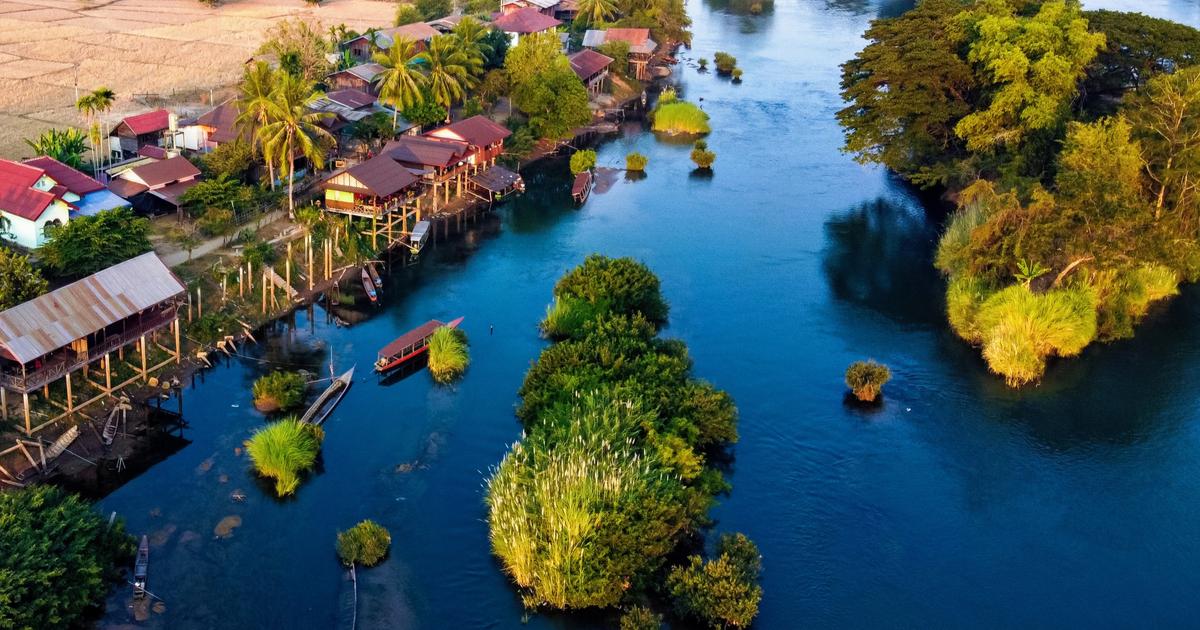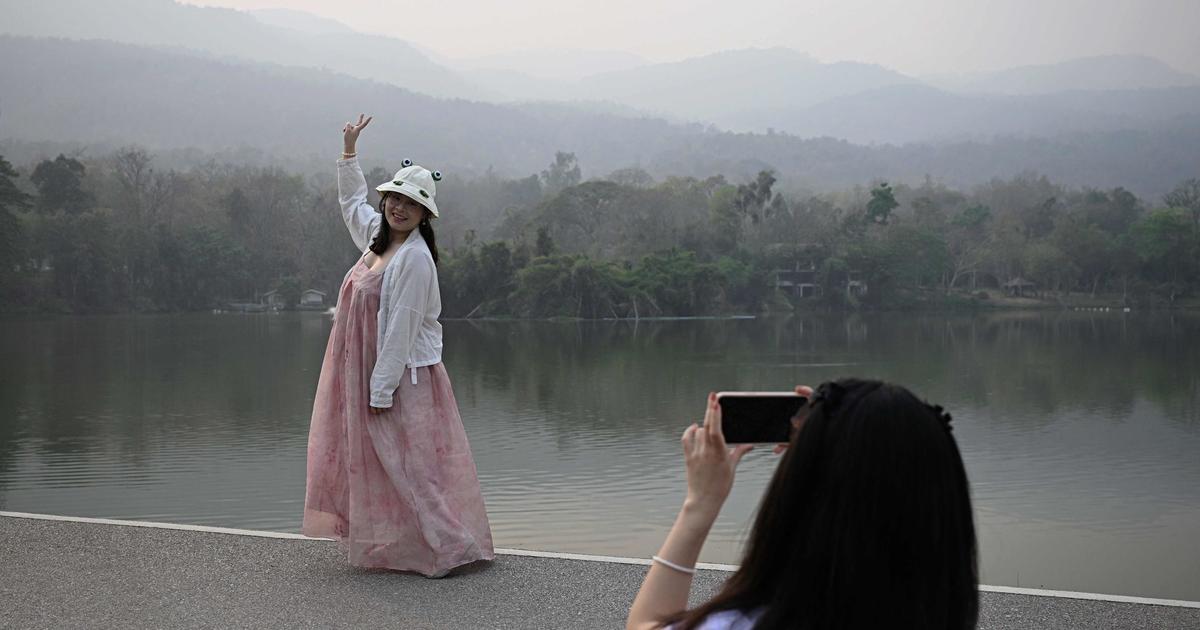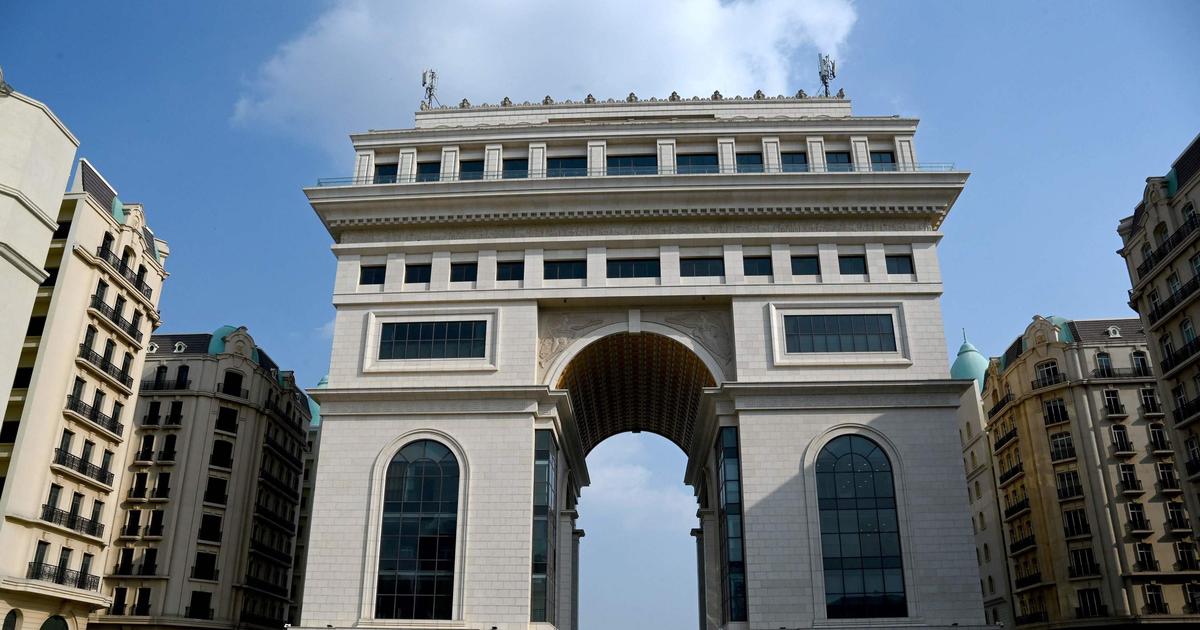Enlarge image
Angkor Wat last March
Photo: Thomas Cristofoletti / DER SPIEGEL
At the archaeological site of Angkor Wat in Cambodia, a UNESCO World Heritage Site,
thousands of people
are currently being forced to leave their homes.
The settlements are located within the famous temple complex, people have lived there for generations.
Most earn money from the tourists who visit the temples: before the pandemic, it was two million every year, Angkor Wat is one of the most popular sights in Cambodia.
During the pandemic, tourism had ground to a halt, and the people of Angkor were suffering from hunger.
Now the visitors are slowly coming back.
The country's Prime Minister, Hun Sen, said in a speech that he is now worried about the future of the well-known landmark.
Because the UNESCO status of the temple complex could be in danger.
Therefore, people should move out of the park and be relocated to a place about an hour further north by car by the end of 2023 at the latest.
In Run Ta Ek, a new community is to be gradually established;
currently it is mostly fallow land.
In a 2008 report, the UNESCO World Heritage Committee expressed concerns about the “uncontrolled” development of the park.
However, the UN agency told Britain's Guardian: "Unesco or the World Heritage Committee have never called for the eviction of the population of Angkor."
The United Nations describes forced evictions as “gross violations of a number of internationally recognized human rights, including the right to adequate housing, food, water, health, education, work, security, freedom of movement.
They often mean cruel, inhuman and degrading treatment.«
A local resident reports on the phone about what has been going on in her village since the threatened evictions. Her profile picture on the Messenger app Signal shows a young woman with long hair.
She does not want to be named, fearing consequences from the park authorities or, in the worst case, losing her job.
She is the only one in the family, she says, who has found a job at a local company.
The others in her family - all of whom live further in the village on the Angkor compound - made a living by selling food to tourists.
Here she tells what she experienced:
'I can't remember exactly when the Inspectorate first showed up in my village, I think it was September.
My village is called Norkor Thom, but many other villages are affected, totaling more than ten thousand people.
So the officials walked through the alleys of my village, pointed to houses, said:
This, this, this, they all have to go
.
They hadn't announced themselves, hadn't spoken to the village overseer, nothing.
It said: We have to move to a settlement called Run Ta Ek.
This is about an hour's drive north.
Many people could not sleep after hearing this.
Were nervous, unable to do anything.
Being at the mercy of that is paralyzing.
Nobody from my settlement wants to move away.
In the new place there are no schools, no hospitals, no jobs.
Parents are concerned that their children will grow up uneducated in the future, losing months or years of education.
Because it will probably take a while before a school is built in the new location.
At the moment, Run Ta Ek isn't a settlement, it's a wide field with nothing else on it.
People are also afraid that they will no longer be able to earn money in the new place.
Many work as tour guides or vendors of Khmer handicrafts;
my family sells local food at a street stall.
Few of the people have an education.
They are also not farmers who could just grow rice in a new place or something.
You would have to start from scratch.
How are the older people supposed to do that?
Business has just picked up again after the years of the pandemic: the visitors are back, from many countries around the world.
You look at the temples and our beautiful nature.
We're making money again.
In the past few years we have used up everything we had saved, we no longer have any reserves.
Many suffered from hunger, caught some fish in the evening, exchanged rice with each other.
And now the government says: You have to go!
The people in the settlements would have to give up their houses and build new ones.
From what money?
The government adds $250, but that's ridiculously little.
After all the crises of the past few years, nobody here has the strength to start over somewhere else.
In October, nearly 3,000 people from the village marched to a protest in front of the Apsara Angkor Parks Authority.
We don't agree to leaving the village
, they shouted.
The media took notice.
Since then no one has come to our village to urge us to leave.
The government is now trying to lure us: it promises money, a piece of land, a car for a certain period of time, some rice.
I've heard from people in neighboring settlements who feel pressured into agreeing to relocate.
That makes me very sad.
I'm not a political person, I don't usually read about the decisions of our politicians.
But I recently watched the speech of our Prime Minister, Hun Sen. He warns those who refuse to resettle: that they are endangering the future of the world heritage site Angkor Wat.
Hun Sen promised that the place we are to move to will soon become a modern settlement and grow from a village to a real city.
I don't think that because of our villages, the Unesco status of the archaeological park could be endangered.
We have always been here.
I was born here.
Even my grandfather was born here.
In our culture, we feel closely connected to the temples, hold ceremonies there, pray, and we still keep the sites alive.
When we're gone, the temples will be just dead stones.
We believe that our ancestors built the temples.
We belong here.
We are part of Angkor Wat.
I would wish that Unesco would stand up for us.
We are also the ones who bring the culture closer to the tourists here, they learn the most from us.
We love this piece of land.
We won't go."
This contribution is part of the Global Society project
Expand areaWhat is the Global Society project?
Under the title »Global Society«, reporters from
Asia, Africa, Latin America and Europe
report on injustices in a globalized world, socio-political challenges and sustainable development.
The reports, analyses, photo series, videos and podcasts appear in a separate section in the foreign section of SPIEGEL.
The project is long-term and is supported by the Bill & Melinda Gates Foundation (BMGF).
A detailed FAQ with questions and answers about the project can be found here.
AreaWhat does the funding look like in concrete terms?open
The Bill & Melinda Gates Foundation (BMGF) has been supporting the project since 2019 for an initial period of three years with a total of around 2.3 million euros - around 760,000 euros per year.
In 2021, the project was extended by almost three and a half years until spring 2025 under the same conditions.
AreaIs the journalistic content independent of the foundation?open
Yes.
The editorial content is created without the influence of the Gates Foundation.
AreaDo other media also have similar projects?open
Yes.
Major European media outlets such as The Guardian and El País have set up similar sections on their news sites with Global Development and Planeta Futuro, respectively, with the support of the Gates Foundation.
Did SPIEGEL already have similar projects? open
In recent years, DER SPIEGEL has already implemented two projects with the European Journalism Center (EJC) and the support of the Bill & Melinda Gates Foundation: the "Expedition ÜberMorgen" on global sustainability goals and the journalistic refugee project "The New Arrivals", within the framework of which several award-winning multimedia reports on the topics of migration and flight have been created.
Expand areaWhere can I find all publications on the Global Society?
The pieces can be found at SPIEGEL on the Global Society topic page.






